
Since 1979, what has been fundamental to RuneQuest and to the world of Greg Stafford’s Glorantha, has been the integration and prominence of its myths, pantheons, and their worship into the setting and as part of everyday life for the Player Characters. Although the original
RuneQuest—more recently published as
RuneQuest Classic—mentioned the importance of cults, it only detailed three of them, offering limited choices for the player and his character. That changed with the publication of
Cults of Prax, which presented fifteen cults and their myths and magics dedicated to fifteen very different deities. Fifteen very different cults and deities which held very different world views and very different means of approaching problems and overcoming them. Fifteen cults which provided their worshippers with a link to their gods and in turn their gods with a link from god time to the real world. Fifteen cults which provided their worshippers with great magics granted by their gods and with paths to become Rune Lords and Rune Priests and so bring the power of their gods into the world.
Cults of Prax provided the
RuneQuest devotee or Gloranthaphile with a framework via which his character could enter the world of Glorantha, giving form and function to faith and above all, making it something that you could play and something that you wanted to play. For at its most mechanical, a player and his character’s choice of cult works almost like a character Class of
Dungeons & Dragons, giving the character benefits and powers in terms of what he can do and how he does it. However, to reduce the cults of Glorantha to such mechanical simplicity is to ignore the ‘why’ of what the character can do, and it is this ‘why’ where the world of Glorantha and its gods, myths, and cults comes alive.
Cults of Prax did not ignore this ‘why’, but introduced it, and that is arguably why it is the most important supplement ever for both Glorantha and
RuneQuest. However, in 2023, some forty-four years after its publication,
Cults of Prax has a successor—or rather, a series of successors.
Cults of RuneQuest is a ten-volume series of supplements each of which is dedicated to the different pantheons of Glorantha. Each entry in the series details the gods—both major and minor—within their pantheon, along with their myths and cults, magics, favoured skills, requirements and restrictions for membership, outlook and relationships with the other gods, and more. Each book is standalone, but because each of the gods and pantheons has connections and often entwining myths with other gods and pantheons, the series will together provide a wider overview of all the gods of Glorantha as well as differing approaches to them. This is further supported by the two companion volumes to the series—
Cults of RuneQuest: The Prosopaedia and
Cults of RuneQuest: Mythology. The standalone nature of the series means that the Game Master or the player—and it should be made clear that each of the ten volumes in the
Cults of RuneQuest is intended to be used by both—can pick or chose their favourite pantheon and use the gods and cults from that book. However, some volumes are quite tightly bound to each other and some are, if not bound geographically, have strong ties to certain regions of Glorantha. So, for example, the first two entries in the series,
Cults of RuneQuest: The Lightbringers and
Cults of RuneQuest: The Earth Goddesses are tightly bound to each other as the myths of their gods often combine and cross paths, not least of which is the fact that the heads of the pantheons in both books are married to each other. Thus, with these two volumes, the first two in the series, it is difficult to argue that one should not be bought without the other. Geographically,
Cults of RuneQuest: The Lightbringers and
Cults of RuneQuest: The Earth Goddesses provide support for the region of Dragon Pass, including Sartar, Esrolia, Prax, and Tarsh, whilst
Cults of RuneQuest: The Lunar Way provides geographical support for the Lunar Empire and its client states. This is not to say that the presence of the cults in these volumes will not be found elsewhere, but rather that these are the regions where their worship is most prevalent and if a Game Master is running campaigns in these locations, then the relevant geographical volume will be very useful. Lastly, of course, the Gloranthaphile will want all of these volumes because he is a Gloranthaphile.
Each of the entries in the
Cults of RuneQuest series is well-organised. The introduction explains the purpose and subject matter for the book, highlights how the book is useful for player and Game Master alike, and examines some of the book’s themes and both their nature as myth and mature treatment of subject matters including death, sex, gender, survival, vengeance, and unconscious fears given form. It also notes that the artwork throughout the book is divided between depictions ‘in-Glorantha’, seen within the world itself, and those seen from without in reading the book. All of this is tailored slightly to the pantheon presented in the particular entry in the series. This is followed by a group depiction of all of the gods of the pantheon—which the book notably returns to a few pages later with a labelled version—and a hymn to them all, and then an overview of the pantheon, answering questions such as, “Where does the world come from?”, “Where do I come from?”, “Why am I here?”, “How do I do magic?”, and more. Lastly, there is a discussion of the relationship that the pantheon has with other pantheons and a listing of all of the gods in the pantheon or associated with it.
The bulk of each book though is dedicated to individual entries in the pantheon. Each of these follows the same format. They begin with the Mythos and History of the god, the Nature of the Cult and its Organisation, its membership at various levels—lay member, initiate, God-Talker, Rune-Lord, Rune-Priest, and Chief Priest, and continue with subservient cults, associated cults, and subcults, and more. This will vary from god to god and from cult to cult. This follows the format seen in
RuneQuest: Roleplaying in Glorantha, but in every case greatly expands what is included in the core rulebook, whether in terms of individual entries or additional entries. The number of pages dedicated to each god and thus each cult will also vary. A god whose worship is widespread—and also a popular choice for players to select for their characters to worship—is explored over the course of multiple pages whereas a less popular and less worshipped god many only receive two or three pages. All gods though, receive a full colour depiction at the start of their entry that includes their runes too, in addition to their being depicted elsewhere.
Cults of RuneQuest: The Earth Goddesses is the second examination of a pantheon in the series. It is a slimmer volume than the first, detailing just sixteen cults in comparison to the nineteen of
Cults of RuneQuest: The Lightbringers. As with the previous volume,
Cults of RuneQuest: The Earth Goddesses begins with the head of the pantheon, Ernalda. Hers is the lengthiest of the entries and mythologies, but nowhere as near as long that given for Orlanth in
Cults of RuneQuest: The Lightbringers. The initial focus is upon Ernalda and her cult and role in society, but it broadens out to examines various facets of her worship. This adds the
Summon Snake Daughter Rune Spell—neatly supporting the depictions of Ernalda with snakes wrapped around her arms—as well as various other Rune spells under subservient and associated cults. Thus for Eninta, the goddess of childbirth, there is the spell Birthing, and for the god of brewing, Minlister, the Rune spell,
Brew, as well as rules for the new skill, Craft (Brewing). The list of subservient and associated cults consists of a mix of deities mentioned just under this entry and those given their own entry elsewhere in the book, such as Babeester Gor and Ty Kora Tek. In addition, there is some crossover with
Cults of RuneQuest: The Lightbringers with the inclusion of Barntar, the Plowman.
The entries for both Aldrya, the Goddess of the Woods, and Mostal, the Maker, are of a similar length to that of Ernalda. In the case of Aldrya, worshipped in particular by the Elves or Aldryami, this includes ‘The Elf Story’, which highlights the differences between the deities worshipped by Humans and the non-gods of the Elves in telling they grew and came to be planted across Dragon Pass. Guidelines are given for Aldrya shamanism, the High King Elf subcult, which is the most widespread, and even Elder Sister for Dryads! In this way, the book is both a useful supplement for the player who wants to play an Elf and the Game Master who wants to support that and create interesting NPCs with a more detailed look at Aldryami culture. In either case, it supports the details of the Aldryami given in the
Glorantha Bestiary. The inclusion of Flamal, the Father of Vegetation, complements Aldrya, though is not as detailed. As with Aldrya, the inclusion of Mostal expands Player Character and NPCs options and backgrounds in similar fashion, but for the Mostali or Dwarves, rather than the Elves. Just as with the entry for Aldyra, the entry explains that Mostal is not revered as a cult as with other gods, but rather that ‘way of Mostal’ is a ‘socio-magical complex’ which structures and organises Dwarf society. Consequently there is less variation here than with other cults and what there is concerns itself mainly with a page or two of new Sorcery spells organised according to Dwarf type and a discussion of heresies, which of course, allows for more Player Character and NPC options.
Besides Ernalda, there are several entries in
Cults of RuneQuest: The Earth Goddesses that will be familiar. Primarily, these consist of Babeester Gor, the Avenging Daughter and Maran Gor, the Earth Shaker, both tightly bound to the Ernalda cult, and they are joined by the God of Music, Dance, and Theatre, Donandar. His inclusion nicely complements the Entertainer occupation in the core rules and covers his half-brothers and similar gods, as well as his links to both Eurmal and the Puppetteer Troupes. Eurmal typically performs as the clown, whilst the half-brothers emphasise different styles of performance. Just as
Cults of RuneQuest: The Lightbringers expanded geographically into Prax by including Waha, so
Cults of RuneQuest: The Earth Goddesses complements this with the inclusion of Erithia. Again, her coverage is more detailed as she fulfils a similar to Ernalda in Prax and her worship is widespread across the region. Ty Kora Tek, the Goddess of the Dead and Underworld, is an interesting addition for older Player Character Earth worshippers, whilst there is a pleasing nod to Apple Lane and its lone temple, with inclusion of Uleria, the Goddess of Love.
In addition to the many entries in
Cults of RuneQuest: The Earth Goddesses which will be familiar, there are many that are not. For example, the Cult of the Bloody Tusk, the god of the Tusk Riders, which again expands upon information in the
Glorantha Bestiary as well as the
RuneQuest Gamemaster Screen Pack, is included, but really only for NPCs, as it comes with the advice that Tusk Riders are not suitable as a Player Characters and no details of the Cult of the Bloody Tusk initiates are given, preventing their creation. Perhaps the strangest inclusion is that of Pamalt, the Earth-King of Pamaltela, the southern continent of Glorantha. There is no denying that it is an interesting read, but given the roleplaying game’s focus upon the northern continent and Dragon Pass, its inclusion is not of immediate use. Other cults in
Cults of RuneQuest: The Earth Goddesses include Asrelia, the Goddess of Wealth and Fortune, as important to miners as protecting the collected harvest; the volcano twins Caladra and Aurelion; the Grain Goddesses, the regional Goddesses of the Land; and Voria, the Spring Virgin. These last few are better suited for NPC use rather than for Player Characters, but they add setting detail in each case.
Physically,
Cults of RuneQuest: The Earth Goddessess is very well written and presented, but needs a slight edit here and there. As with the earlier
Cults of RuneQuest: The Prosopaedia and the
Cults of RuneQuest: The Lightbringers, what stands out is the quality of the artwork, which begins with its cover and its depiction of Ernalda. In comparison to the majestic imposition of power in the depiction of Orlanth on the cover of
Cults of RuneQuest: The Lightbringers, that of Ernalda on the cover of this book is all poise and assurance. The power of the Earth goddesses are instead saved for the energetic, even manic illustrations of Babeestor Gor and Maran Gor. In many of the illustrations there is a sense of embracing warmth, but whatever the nature of the gods and goddesses depcted in the volume, the artwork is uniformly excellent.
Cults of RuneQuest: The Earth Goddessess continues the series’ options for the players and their characters in terms of who and what they want to play and what gods they want their characters to embody, providing them with the background and the details to do so and the Game Master to also make interesting NPCs. There are perhaps more options for the latetr than the former in
Cults of RuneQuest: The Earth Goddessess, but all of the entries add background detail and flavour to the world of Glorantha.
Cults of RuneQuest: The Earth Goddessess is the second essential book in the series for
RuneQuest: Roleplaying in Glorantha, complementing
Cults of RuneQuest: The Lightbringers with connections between their respective pantheons as well as expanding upon the information, background, and options for the Earth goddesses.
—oOo—
An unboxing video of
Cults of RuneQuest: The Earth Goddesses is available to watch on
Unboxing in the Nook.
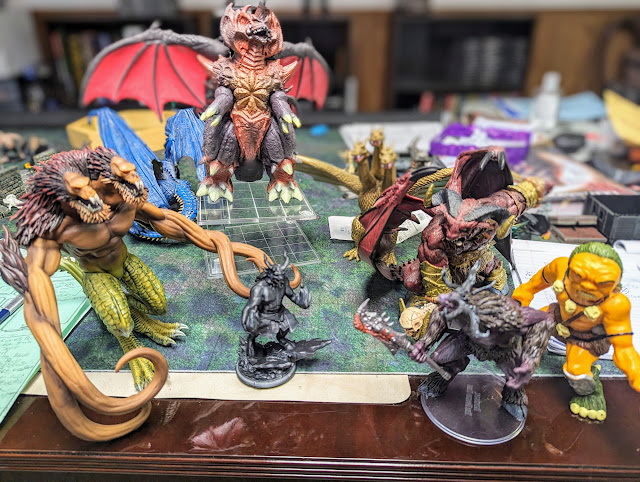 A collection of DIY Demons
A collection of DIY Demons D&D Demons with your humble 5'9" blogger to scale.
D&D Demons with your humble 5'9" blogger to scale.
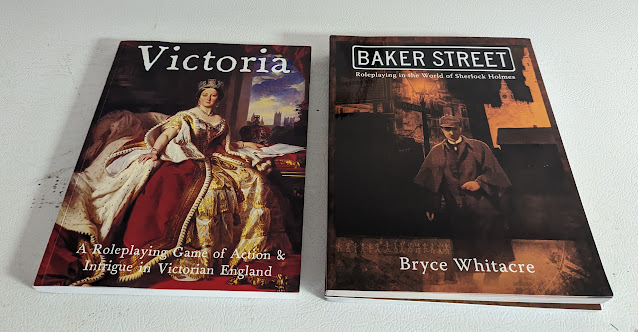
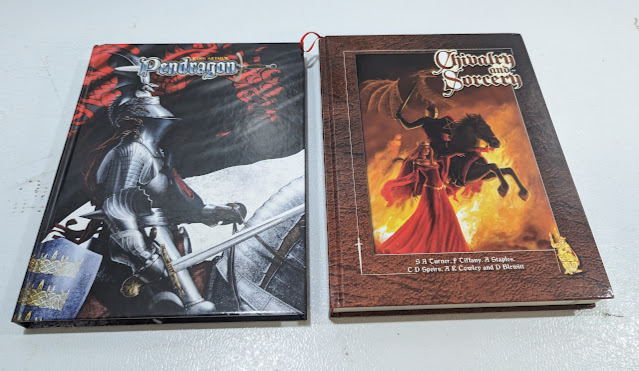
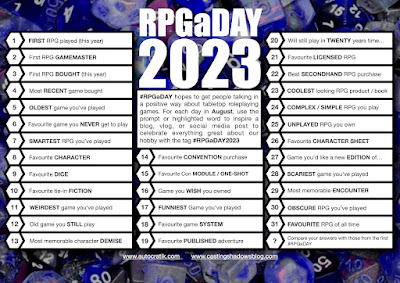

.jpg)

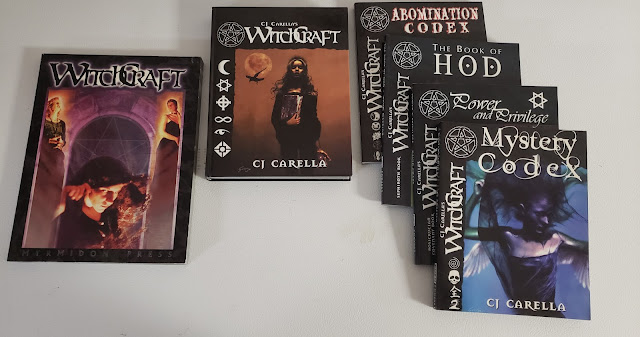

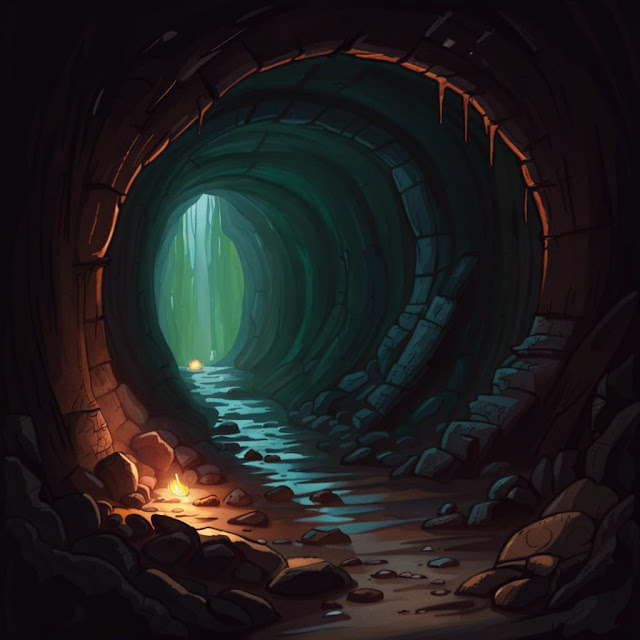

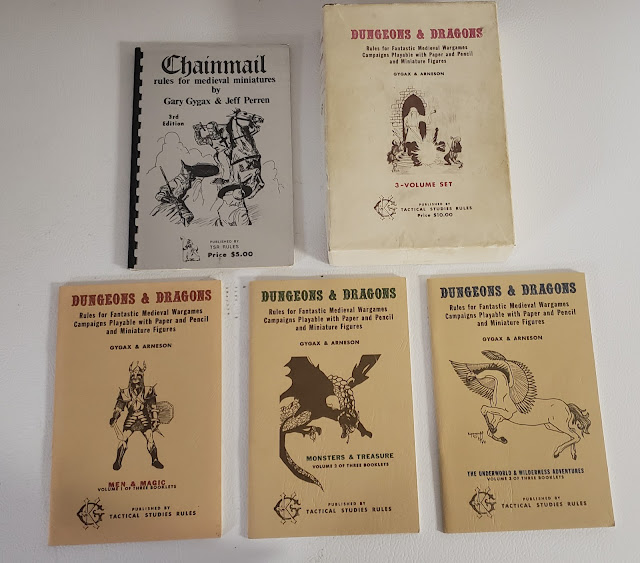
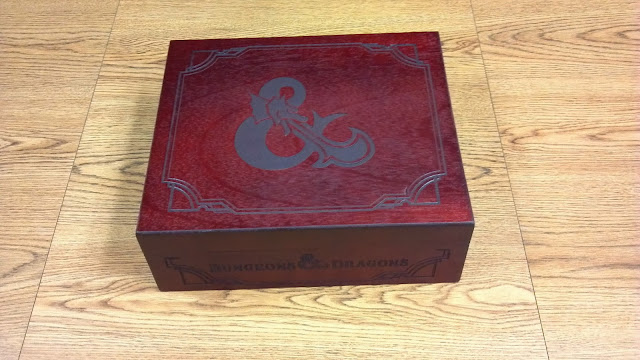




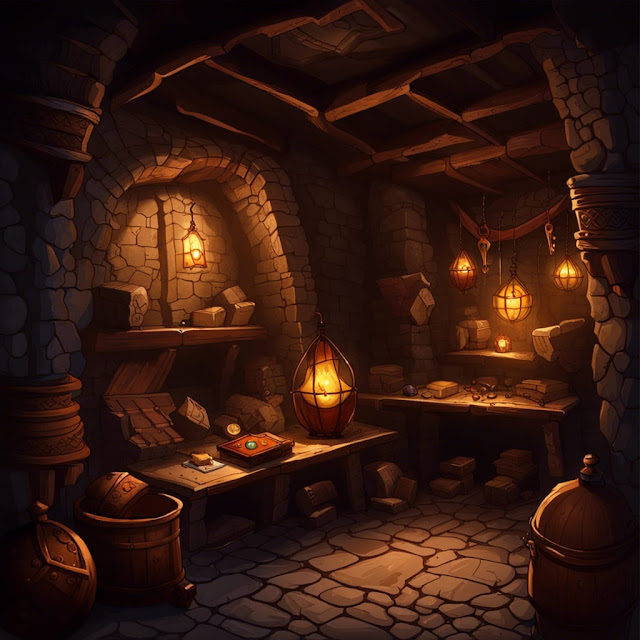





.jpg)
